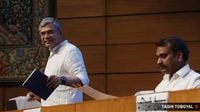Lucknow, 30 April 2025: The All India People’s Front (AIPF) has applauded the Indian government's decision to include caste enumeration in the upcoming population census, calling it a significant and timely step. Union Minister Ashwini Vaishnaw announced this decision during a Cabinet briefing, emphasizing the importance of conducting the census in a transparent manner. This announcement comes after the government faced mounting pressure from opposition parties regarding caste-based data, especially following Bihar's caste survey in 2023.
Vaishnaw stated, "According to the Constitution of India, Census is a Union Subject. Some states have conducted surveys to enumerate castes, but these have often been politically motivated and non-transparent." He highlighted that the Modi government is committed to ensuring that caste enumeration is conducted as part of the national census, thereby strengthening the social and economic framework of the country.
The AIPF has urged the government to set a timeline for the census, which was postponed in 2021 due to the COVID-19 pandemic. They pointed out that the last full-scale caste count in India occurred in 1931, and since then, comprehensive data on various caste groups has been lacking. The AIPF has also called for the inclusion of specific columns in the census to capture the representation of all castes in economic, educational, and government jobs, which they believe will inform future policy-making.
Vaishnaw further criticized previous governments, particularly the Congress-led United Progressive Alliance (UPA), for failing to conduct a caste census. He noted that while the UPA had promised to consider caste enumeration, it ultimately conducted surveys that did not yield reliable data. "Congress governments always opposed caste census, which was not included in census operations since independence," he remarked.
Historically, the census in India has been a vital tool for understanding the demographic makeup of the population. The British initiated population counting in India in 1872, and between 1881 and 1931, the census listed all castes. However, since independence, only Scheduled Castes (SCs) and Scheduled Tribes (STs) have been included in census data, leaving out a significant portion of the population.
The last population census was conducted in 2011, which reported a total population of 1.21 billion and a sex ratio of 940 females per 1,000 males. As India prepares for its next census, which is set to be the first digital census utilizing mobile apps and online portals, the inclusion of caste data is seen as a critical step towards addressing social inequalities.
Critics of caste enumeration argue that it could further entrench caste identities and lead to increased demands for reservations. However, proponents assert that accurate caste data is essential for reshaping affirmative action policies and ensuring equitable resource allocation. A caste census could help identify marginalized communities that require more support, thereby enabling the government to design targeted schemes to uplift disadvantaged groups.
The AIPF has also called for the ‘Sarna Dharma’ of the Santhal/Oraon tribals to be included in the list of religions, and for the restoration of the ‘other religion’ category in the census. This request underscores the need for a more inclusive approach to data collection that reflects the diverse identities within India.
As the government moves forward with this initiative, it remains to be seen how the caste census will impact India's social and political landscape. The decision to include caste enumeration is not just a matter of data collection; it represents a commitment to addressing long-standing issues of caste-based discrimination and inequality.
In conclusion, the inclusion of caste enumeration in the upcoming census is a pivotal moment for India. It has the potential to reshape policies and improve the lives of millions by providing a clearer understanding of the socio-economic conditions of various caste groups. The commitment to transparency and inclusivity in this process will be crucial as the government seeks to navigate the complexities of India's diverse society.





